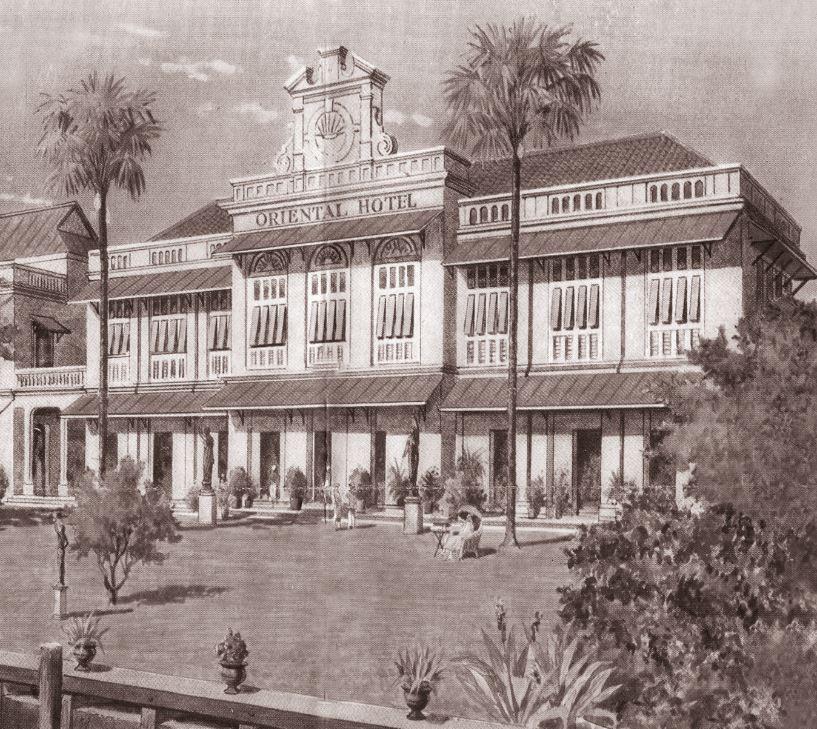A Writer’s Refuge on the River Menam
The Oriental Hotel in Bangkok—today known as Mandarin Oriental, Bangkok—has long stood as a monument to colonial elegance, poised on the banks of the River Menam (Chao Phraya). Throughout its history, this iconic hotel has played host to diplomats, dignitaries, royalty, and writers. Among them, perhaps none left a more indelible literary impression than William Somerset Maugham. The famed British author first arrived at The Oriental in 1923, bringing with him both literary genius and an unfortunate bout of malaria that nearly ended his life within its walls.
Today, the hotel honours him with the Somerset Maugham Suite, one of several named after its most illustrious guests—including Joseph Conrad and Graham Greene—each echoing the artistic legacy left behind by these visitors.
Arrival in the East: Maugham in 1923
Maugham’s introduction to Bangkok came during a grand tour of Southeast Asia. After an overland journey from Chiang Mai, he arrived in the capital by train on January 6, 1923, seeking both inspiration and rest. The Bangkok of the 1920s, however, was no serene Eden in his eyes. In The Gentleman in the Parlour, Maugham’s travel memoir published in 1930, he described the city with thinly veiled distaste:
“It is impossible to consider these populous modern cities of the East without a certain malaise... They have no history and no traditions. Painters have not painted them. No poets... have given them a tremulous melancholy not their own.”
Despite his discomfort, the grand Oriental—already renowned for its riverside charm—offered him sanctuary. His room overlooked the Chao Phraya, cooled by cross-breezes through shuttered verandahs. But the romance of the tropics quickly gave way to an ordeal.
A Battle with Malaria
Soon after arriving, Maugham became seriously ill. He had contracted malaria during his stay in northern Siam (modern-day Thailand), having unwittingly slept in an unprotected bed without a mosquito net. Feverish and delusional, he recorded:
“I took my temperature. I was startled to see that it was a hundred and five. I could not believe it, so I took it again; it was still a hundred and five.”
In the days that followed, he drifted in and out of consciousness at The Oriental. The luxurious bathrooms and silent Chinese attendants offered little relief. The hotel’s manager at the time, Madame Maria Maire, was deeply concerned—not just for his health, but for the hotel's reputation. She was overheard telling the attending doctor:
“I can’t have him die here, you know. You must take him to the hospital.”
Mercifully, the crisis passed. Maugham recovered gradually, seated quietly in the hotel's shaded lounge or gazing out at the languid brown waters of the river. The stillness helped restore him. In his haze of post-fever convalescence, he found the mental quietude to compose a whimsical fairy tale, later included in The Gentleman in the Parlour.
The Oriental: More Than a Backdrop
The Oriental was more than just a setting in Maugham’s travelogue—it became an active participant in his Southeast Asian experience. He described it as dim and airless, yet oddly comforting in its worn luxury. Meals were served in silence by Chinese waiters; the heat of the city seeped into every corner of the colonial mansion.
The hotel’s bathrooms, considered cutting-edge at the time, drew admiration even from the Thai royal family, who reportedly sent palace aides to study their design. In a city where the gilded magnificence of wats (temples) overwhelmed him, The Oriental offered a more subdued form of grandeur.
Return to The Oriental: 1925 and 1960
Maugham returned to Bangkok—and to The Oriental—in 1925, this time in full health. His earlier suffering did not deter him; instead, he had grown fond of the hotel’s sedate charm. He spent two tranquil weeks revisiting the city, this time without illness to cloud his impressions.
His final visit came in 1960, when he was 85 years old. A literary lion in the winter of his years, Maugham was celebrated by the hotel where he had once hovered on the edge of death. He recalled, with wry humour:
“I was almost evicted from The Oriental because the manager did not want me to ruin her business by dying in one of her rooms.”
A Legacy Immortalised in Brick and Prose
Maugham’s stay at The Oriental became part of literary lore. His nuanced observations—tinged with colonial prejudice, personal discomfort, and rare moments of poetic insight—captured a snapshot of a bygone Bangkok, one that teetered between East and West, tradition and modernity.
Today, the Somerset Maugham Suite preserves his memory, complete with period furnishings, photographs, and excerpts from his writings. Visitors can retrace his steps through the hotel's teak verandahs and shaded courtyards, perhaps even envisioning the frail Englishman, notebook in hand, recovering from his fever as the sun sets over the River Menam.
About William Somerset Maugham
Born in 1874 in Paris, William Somerset Maugham was trained as a doctor before turning to writing full-time. He became one of the most successful and cosmopolitan authors of his era. His works, spanning novels, short stories, and plays, include classics such as Of Human Bondage, The Moon and Sixpence, and The Razor’s Edge. His travel writing, including The Gentleman in the Parlour, offers a richly textured, if occasionally biased, view of early 20th-century Asia.
Further Reading and Resources
- The Gentleman in the Parlour by W. Somerset Maugham
- The Oriental by Andreas Augustin & Andrew Williamson
- The Mandarin Oriental Bangkok: Heritage Suites and Notable Guests
- Biography of Somerset Maugham (1874–1965)




